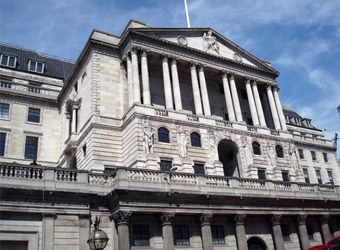The Bank of England (BOE) held on Thursday interest rates steady at 0.25 percent, though an unexpected rise in support for a rate hike among its committee policymakers sent sterling higher.
The central bank was widely expected to remain cautious at its latest monetary policy committee meeting, particularly given the inconclusive election last week and the precarious position of the U.K. economy ahead of Brexit talks.
However, two BOE rate-setters joined last month’s sole dissenter, Kristin Forbes, in voting for a 25 basis point rate hike. Michael Saunders and Ian McCafferty – the policymakers identified as the most likely to push for an increase in interest rates – defied Governor Mark Carney’s proposition for the bank rate to be maintained at 0.25 percent.Source: Bloomberg
“Despite elevated political and economic uncertainty, the Bank of England seems to be heading for a first rate hike soon,” Kallum Pickering, senior U.K. economist at Berenberg, told CNBC in an email.
“Today, three members – all known hawks – voted for higher rates. This gradual shift in stance represents the Monetary Policy Committee’s efforts to foretell and communicate a forthcoming hike. Don’t ignore it,” he added.
The 5-3 vote split among the committee represented the closest the monetary policy committee had come to supporting a rise since 2007. The BOE currently only has eight members after Charlotte Hogg stepped down in March.
Had rate-setters voted 4-4 to lift interest rates by 25 basis points, Carney would have ultimately decided the outcome. The BOE’s last monetary policy move came back in August last year when Carney announced an emergency rate cut following the U.K.’s vote to leave the European Union.
Meantime, the Committee voted unanimously to maintain corporate bond purchases at £10 billion (12.7 billion).
Further to this, all rate-setters supported keeping the stock of U.K. government bond purchases unchanged at £435 billion.
The BOE had faced increasing pressure to consider a rate hike ahead of Thursday’s meeting as inflation soared to highs not seen in almost four years. Prices surged to 2.9 percent last month – almost a full percentage point higher than the central bank’s target.
“May’s minutes had revealed it would take little additional upside news on the prospects of activity or inflation for Monetary Policy Committee members to consider a more immediate reduction in policy support,” Michael Metcalfe, global head of macro strategy at State Street Global Markets, told CNBC in an email.
“It seems clear today the BoE’s immediate concern (regarding) inflation is trumping what potential political fallout there may be on the economic outlook,” he added.
On Thursday, the Committee noted that the most significant change in the financial markets since meeting in May had been the depreciation of the sterling exchange rate.
Sterling has fallen by around 2.5 percent compared to the 15 working day average used in the BOE’s May Inflation Report, with a substantial part of the depreciation coming about as a consequence of the General Election last week.
Shortly after the BOE’s announcement on Thursday, sterling surged against the euro to hit its highest level in a week. The U.K. currency also spiked by a full cent against the dollar to trade $1.2795 just after midday.
While investors detected a mild sense of hawkishness from the central bank’s policymakers a few weeks ago, Thursday’s meeting had been expected to convey a much more dovish tone.
Instead, three rate setters are now in favor of raising interest rates by 25 basis points. The BOE did note all three dissenters would wish to increase rates at a gradual pace and to a limited extent.
Governor Carney expressed his thanks to Kristin Forbes, one of the rate setters in favor of lifting rates, for her final contribution before she steps down as a member of the Committee.
Source: CNBC


